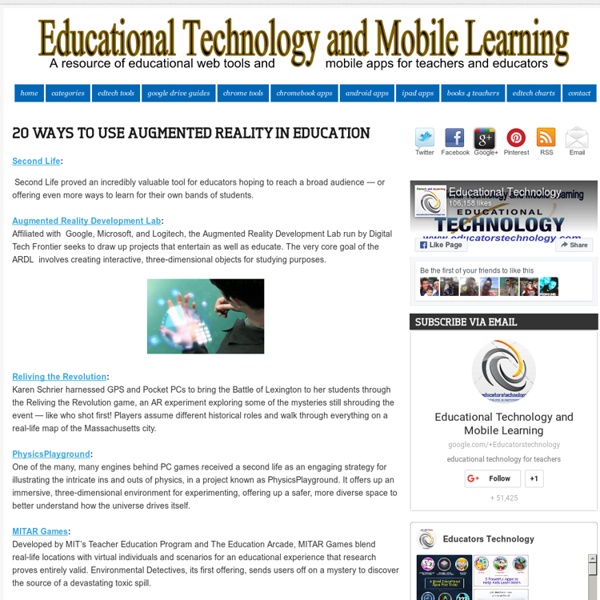Realidad Aumentada que es "real" y centrado en el aprendizaje
Augmented Reality allows you to expand the experience of the real world with information, video, sound, GPS data, and so on. If well utilized, it can be much more than just another cool tech thing… You will see below an example of how Augmented Reality was used to expand the experience of visitors to our school’s Art Exhibit. As students had to reflect on and verbalize their artistic choices, an augmented reality layer was created for viewers of the exhibit. In the process, students were excited about sharing with an authentic audience and had to really recall and reflect. It created a hyperlinked reality that enabled amplification of the viewers’ learning experience that was much more engaging than text. By pointing a tablet or smartphone at a painting, through the viewing lens of Aurasma App, visitors could learn about the artist that influenced the work and techniques that were applied.
5 Top Augmented Reality Apps For Education
The concept of augmented reality has been in existence for a few years now despite the fact that many users of mobile devices are under the impression that it is a new phenomenon. New technologies such as Google’s augmented reality glasses which are the first computing eyewear are still in the testing phase. This leads mobile device users to believe augmented reality is new on the horizon.
How Integrating Physical Art Into Digital Creations Expands Creativity
Students in Cathy Hunt’s art classes are constantly blurring the lines between physically created art and digital creations. In one project, students created fish out of clay using old pinch-potting techniques. But the project didn’t stop there. They then took photos of their creations and used digital tools to paint on the photos, adding color and design without fear that an unknown glaze would ruin their vision. Once they designed their fish, they developed a storyline featuring their creations for a stop motion animation created by the whole group.
Objetos inteligentes
The Smarter Objects system explores a new method for interaction with everyday objects. The system associates a virtual object with every physical object to support an easy means of modifying the interface and the behavior of that physical object as well as its interactions with other "smarter objects". As a user points a smart phone or tablet at a physical object, an augmented reality (AR) application recognizes the object and offers an intuitive graphical interface to program the object's behavior and interactions with other objects. Once reprogrammed, the Smarter Object can then be operated with a simple tangible interface (such as knobs, buttons, etc). As such Smarter Objects combine the adaptability of digital objects with the simple tangible interface of a physical object.
AR SPOT: un entorno de programación de realidad aumentada para los niños »Augmented Environments Lab
AR SPOT is an augmented-reality authoring environment for children. An extension of MIT’s Scratch project, this environment allows children to create experiences that mix real and virtual elements. Children can display virtual objects on a real-world scene observed through a video camera, and they can control the virtual world through interactions between physical objects.
The complete guide to virtual reality – everything you need to get started
Until recently, virtual reality had been something of a fantasy for storytellers and technologists. As long ago as 1935, American science fiction writer Stanley G Weinbaum described something like virtual reality in a short story called Pygmalion’s Spectacles. “But listen – a movie that gives one sight and sound. Suppose now I add taste, smell, even touch, if your interest is taken by the story.
Cómo utilizar la realidad aumentada en la Educación
When you were a kid, did you watch RoboCop and totally love the heads-up display? What about the fascinating visuals in Minority Report or Iron Man? They’re basically a form of augmented reality (AR for short).
Código Opensource para producciones de Realidad Aumentada
Augmented Reality is the name given to technology that integrates virtual data on real world in real time, using for it something technologic. We have some nice examples of uses on our blog. Some people call it "Reality Expanded," but the term "Augmented Reality" was the most famous and there is nothing to do about it. Let's call it "A.R." from now on, to save characters and save the nature and the world. In the future, we will have a section "Learning", explaining details of the process. For now, you can use our to create one, without having to sweat a lot.



